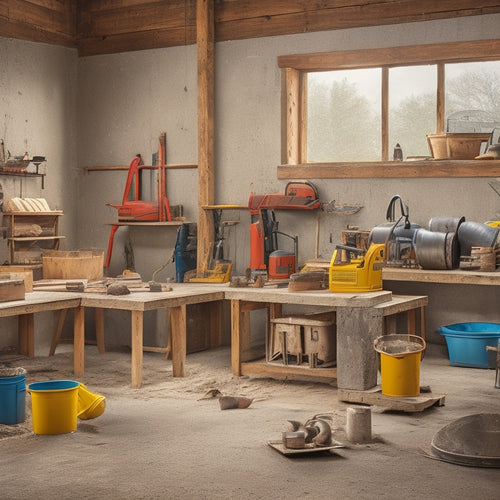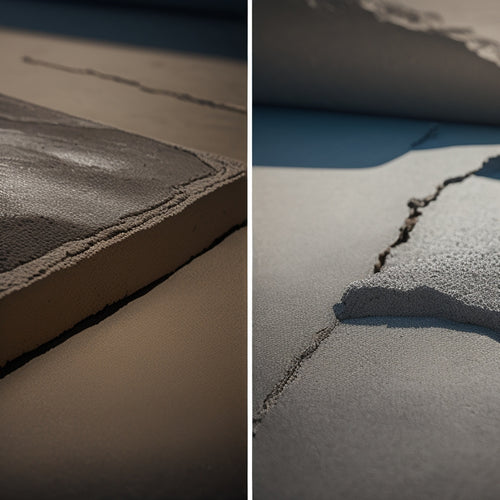
Why Invest in Quality Concrete Mixing Tools
Share
When you invest in quality concrete mixing tools, you're ensuring precise blends, flawless finishes, and solid foundations. High-quality mixers, tamping tools, and drill bits guarantee efficient and accurate results. Safety gear and durable wheelbarrows protect you and your team while transporting heavy loads. Robust trowels and edgers create smooth, clean lines, and heavy-duty mix buckets handle large batches with ease. Additionally, advanced finishing tools take your work to the next level. By understanding the importance of each tool, you'll be well on your way to mastering the art of concrete mixing – and there's more to discover when you take a closer look at the details that make all the difference.
Key Takeaways
• Quality concrete mixing tools ensure consistent, uniform blends, reducing downtime and operating costs.
• Efficient tamping and compaction prevent air pockets, ensuring solid foundations and structure strength.
• Reliable drill bits and safety gear protect workers and enhance performance, reducing injuries and premature wear.
• Durable wheelbarrows and mix buckets facilitate easy transport and efficient mixing, reducing fatigue and injuries.
• Precise leveling, slump control, and advanced finishing tools guarantee smooth, even surfaces, and high-quality finished products.
Quality Mixers for Perfect Blends
You'll need a high-quality mixer that can handle heavy workloads and produce consistent, uniform blends to achieve the perfect mix of concrete. A reliable mixer is essential for guaranteeing the quality of your concrete, and it's vital to invest in one that meets your specific needs.
Look for innovative mixer designs that incorporate advanced technology, such as planetary mixing action or twin-shaft mixing, to guarantee thorough blending and minimize material waste.
In addition to selecting the right mixer, you'll need to prioritize mixer maintenance tips to extend its lifespan and optimize performance. Regularly inspect and clean the mixer to prevent material buildup and corrosion.
Lubricate moving parts and check for wear and tear on components. By following these tips, you can guarantee your mixer continues to produce high-quality concrete blends consistently.
A well-maintained mixer will also reduce downtime and lower operating costs, ultimately saving you time and money. With the right mixer and proper maintenance, you'll be able to achieve the perfect mix of concrete every time.
Efficient Tamping for Solid Foundations
When you're working on a concrete project, you know that a solid foundation is essential.
You're likely aware that efficient tamping is key to achieving this, but you may not know that the technique you use can greatly impact the final result.
Tamping Techniques Matter
By mastering efficient tamping techniques, contractors can guarantee solid foundations by preventing air pockets and excess water from compromising the structural integrity of freshly poured concrete.
You know that a well-tamped surface is essential for a strong, durable structure. To achieve this, you need to use the right tamping equipment and follow proper techniques.
Here are some key takeaways to keep in mind:
-
Use a tamper with a flat, wide blade to cover more surface area and apply even pressure.
-
Hold the tamper at a 45-degree angle to prevent air pockets from forming.
-
Apply gentle, consistent pressure, working in sections to avoid over-tamping.
-
Use a screed board or level to ascertain the surface is even and level.
-
Check the concrete's consistency and adjust your tamping technique accordingly.
Compaction for Strength
To guarantee a solid foundation, compacting concrete efficiently is important, as it directly affects the structure's strength and durability. You can't afford to overlook this significant step, as improper compaction can lead to settlement, cracking, and even collapse.
When you compact concrete correctly, you eliminate air pockets and make sure the mixture is evenly distributed, resulting in a stronger, more stable foundation.
Employing the right compaction techniques is essential. You'll want to use a combination of manual and mechanical methods, depending on the size and type of project. For instance, hand tamping is effective for small areas, while plate compactors or rollers are better suited for larger projects.
Remember to compact in layers, allowing each layer to set before adding the next. This helps prevent over-compaction, which can lead to density variations.
Soil compaction is also important, as it affects the foundation's ability to support the structure's weight. By using the right compaction techniques and tools, you'll guarantee a solid foundation that can withstand the test of time.
Reliable Drill Bits for Accuracy
When you're working with concrete, you know that accuracy is essential, and it all starts with reliable drill bits.
You're about to learn how the right materials, ideal speed and torque, and strategies for reducing wear can make all the difference in your drilling operations.
Drill Bit Materials Matter
You demand precision and accuracy from your concrete mixing tools, and that starts with selecting drill bits made from high-quality materials that can withstand the rigors of drilling into concrete. The type of material used in your drill bits can greatly impact their performance and longevity.
When it comes to drill bit materials, you have several options to choose from, each with its own strengths and weaknesses.
Here are some common materials used in drill bits and their characteristics:
-
Tungsten Carbide (TC): Extremely hard and wear-resistant, ideal for drilling into hard concrete and rebar.
-
High-Speed Steel (HSS): A cost-effective option for drilling into soft to medium concrete.
-
Cobalt Steel: Offers a balance between hardness and flexibility, suitable for drilling into medium to hard concrete.
-
Diamond-Coated: Features a diamond-coated tip for enhanced durability and performance in harsh drilling conditions.
-
Carbide-Tipped: A cost-effective alternative to TC bits, offering a balance between performance and affordability.
Bit Speed and Torque
Optimizing bit speed and torque is critical to ensuring accurate hole placement and preventing damage to your drill bits, as excessive speed can lead to premature wear and reduced drilling performance.
When you're working with concrete, you need reliable drill bits that can handle the tough job. By finding the sweet spot for bit speed and torque, you'll experience improved bit performance and reduced downtime.
You'll want to evaluate the type of drill bit you're using, as well as the specific concrete you're working with. For example, diamond-coated bits are designed for high-torque applications, while carbide-tipped bits are better suited for lower-torque drilling.
By matching your bit to the job, you'll achieve better torque efficiency and reduce the risk of damage. Remember, it's not just about drilling fast – it's about drilling smart.
Reducing Drill Bit Wear
Selecting reliable drill bits that minimize wear is essential for achieving accurate hole placement and reducing downtime, as worn-out bits can lead to deviations in hole diameter and location. You can't afford to compromise on the quality of your drill bits, especially when working with concrete.
To reduce drill bit wear, follow these best practices:
-
Regularly inspect your drill bits for signs of wear, such as chipping, cracking, or excessive heat buildup.
-
Implement drill maintenance tips, such as cleaning and lubricating your drill bits regularly, to prevent wear and tear.
-
Use bit sharpening techniques to maintain a sharp cutting edge and reduce the risk of wear.
-
Choose drill bits with durable coatings and materials that can withstand the rigors of concrete drilling.
-
Store your drill bits properly when not in use to prevent damage and corrosion.
Essential Safety Gear for Protection
Wearing personal protective equipment (PPE) is essential when working with concrete mixing tools to prevent injuries from hazardous materials and equipment. You must adhere to strict safety standards to guarantee your protection.
As you work with concrete, you're exposed to dust, debris, and heavy machinery, which can cause serious harm if you're not properly equipped.
Invest in high-quality protective gear, including hard hats, safety glasses, and dust masks. These will shield you from falling objects, flying particles, and airborne contaminants.
Don't forget to wear heavy-duty gloves, which will provide grip, protection, and control when handling heavy tools and materials. Steel-toed boots are also a must, as they'll safeguard your feet from heavy impacts and crushing injuries.
Durable Wheelbarrows for Easy Transport
You'll need a reliable and sturdy wheelbarrow to efficiently transport heavy loads of concrete and mixing tools around the job site, ensuring you can complete tasks quickly and safely. A durable wheelbarrow is essential for reducing fatigue and preventing injuries. Look for wheelbarrows made from high-quality materials, such as steel or polypropylene, which can withstand the rigors of heavy use.
When selecting a wheelbarrow, consider the following features:
-
Ergonomic design with comfortable grips and a balanced weight distribution
-
Heavy-duty wheels with a sturdy axle for smooth movement
-
A large, rust-resistant tub with a non-slip surface for easy loading and unloading
-
A sturdy frame with reinforced legs for added stability
-
A manageable weight capacity that suits your specific needs
Precise Leveling for Perfect Finishes
When you're aiming for a flawless concrete finish, you know that precise leveling is essential.
You'll want to make certain accurate slump control to avoid unevenness, and a reliable leveling tool will assure an even surface every time.
Accurate Slump Control Matters
Regularly monitoring and adjusting the slump of your concrete mixture is essential to achieving a perfect finish, as even slight variations in consistency can greatly impact the final product's quality and appearance.
You can't afford to overlook this critical aspect, as it directly affects the workability, strength, and durability of the concrete.
To get it right, you need to perform regular slump testing to guarantee the ideal water-to-cement ratio.
Here's what's at stake if you don't:
-
Uneven surfaces and rough finishes
-
Increased risk of cracks and shrinkage
-
Reduced strength and load-bearing capacity
-
Inconsistent color and texture
-
Delays and increased labor costs due to rework
Even Surface Assurance Guaranteed
Achieving a perfectly level surface is vital to showcasing the full potential of your concrete creation, as it directly influences the aesthetic appeal and overall quality of the finished product. You'll want to make certain that your surface preparation is meticulous, as any imperfections can lead to a subpar finish.
With high-quality concrete mixing tools, you can rest assured that your surface will be even and level. Using precise leveling tools, you can guarantee a flawless finish. These tools allow you to accurately measure and adjust the surface, eliminating any deviations or irregularities.
By doing so, you'll be able to achieve a smooth, even surface that's perfect for applying finishing techniques. Whether you're working on a decorative concrete project or a large-scale construction endeavor, precise leveling is vital.
With the right tools, you'll be able to achieve a professional-grade finish that meets your high standards. Remember, a level surface is the foundation of a superior finish, and investing in quality concrete mixing tools will ensure you get it right every time.
Robust Trowels for Smooth Finishing
Your search for a flawless concrete finish begins with a robust trowel that can withstand the rigors of heavy use and deliver a high-quality, smooth finish.
A sturdy trowel is vital for mastering advanced trowel techniques, which are essential for achieving a polished look. With a reliable trowel by your side, you'll be able to add those all-important finishing touches to your concrete projects.
Here's what you can expect from a high-quality trowel:
-
A durable, high-carbon steel blade that resists wear and tear
-
A comfortable, contoured handle that fits snugly in your hand
-
A precision-ground edge that glides smoothly over the concrete surface
-
A rust-resistant coating that guarantees long tool life
-
A balanced design that reduces fatigue and improves control
Heavy-Duty Mix Buckets for Capacity
When you're working with large batches of concrete, you need a heavy-duty mix bucket that can handle the capacity, providing you with ample room to combine and mix your materials efficiently. A sturdy mix bucket guarantees that you can tackle large projects without worrying about the bucket collapsing or compromising the quality of your mix.
Here's a comparison of different mix bucket capacities and their ideal uses:
| Capacity (Liters) | Ideal Use |
|---|---|
| 50-100 | Small repairs, DIY projects |
| 150-250 | Medium-sized construction projects |
| 300-400 | Large commercial projects, infrastructure development |
| 500-600 | Industrial-scale construction, high-volume production |
| 800+ | Mega-projects, large-scale infrastructure development |
When selecting a mix bucket, consider factors such as mix bucket durability and versatility. A durable mix bucket withstands heavy use and harsh environments, while a versatile one can be used for various applications and materials. By investing in a high-quality mix bucket, you guarantee that your concrete mixing process is efficient, effective, and produces consistent results.
Advanced Finishing Tools for Perfection
To take your concrete finishing to the next level, you'll need advanced finishing tools that provide precision control and versatility, allowing you to achieve a flawless, high-quality finish.
With the right tools, you'll be able to master advanced smoothing techniques and work with innovative finishing materials to create a superior finish.
Here are some essential advanced finishing tools to evaluate:
-
Tamping tools with adjustable handles for precise control over tamping pressure
-
High-carbon steel finishing trowels with curved blades for smooth, even finishes
-
Long-handled edgers with adjustable depths for creating clean, precise edges
-
Power floaters with rotating blades for efficient, high-quality finishing
-
Laser-guided screeds for precision leveling and alignment
These advanced finishing tools will give you the precision and control you need to achieve a high-quality finish.
By investing in these tools, you'll be able to take your concrete finishing to the next level and deliver exceptional results that meet the highest standards.
With the right tools and techniques, you'll be able to achieve a flawless, professional finish that will impress even the most discerning clients.
Long-Lasting Edgers for Clean Lines
You'll need edgers that can withstand the rigors of repeated use and harsh job site conditions to create clean, sharp lines that define your concrete slab's perimeter. A long-lasting edger is essential for achieving professional-looking results. When selecting an edger, consider the materials and design features that guarantee durability and performance.
| Edger Materials | Design Features |
|---|---|
| High-carbon steel | Reinforced handle for added strength |
| Durable aluminum | Ergonomic grip for reduced fatigue |
| Heavy-duty rubber | Adjustable blade angle for versatility |
| Fiber-reinforced polymer | Protective guard for operator safety |
| Rust-resistant stainless steel | Quick-release mechanism for easy blade change |
Look for edgers made from high-quality materials that can resist corrosion and withstand heavy use. Design features such as reinforced handles, ergonomic grips, and adjustable blade angles also contribute to an edger's longevity and performance. By investing in a long-lasting edger, you'll achieve clean, sharp lines that enhance the overall appearance of your concrete slab.
Frequently Asked Questions
Can I Use a Regular Drill for Mixing Concrete?
You can't rely on a regular drill for mixing concrete, as its drill limitations compromise mixing efficiency, leading to inconsistent results and increased labor time; a dedicated concrete mixer is necessary for ideal performance.
Are Expensive Mixing Tools Worth the Investment?
"Just like a professional chef wouldn't settle for a flimsy whisk, you shouldn't compromise on mixing tools. Investing in quality ones pays off in cost efficiency and long-term durability, ensuring consistent results and reduced maintenance, ultimately saving you time and money."
How Often Should I Replace My Concrete Mixing Tools?
You should replace your concrete mixing tools every 6-12 months, depending on usage and maintenance, following tool maintenance tips to extend mixing tool lifespan, and monitoring signs of wear and tear for ideal performance.
Can I Share Mixing Tools With Other Construction Teams?
"Go ahead, share your mixing tools with other teams - what could possibly go wrong, right? But seriously, consider mixing tool compatibility and shared equipment logistics to avoid project delays and compromised concrete quality."
Are There Any Eco-Friendly Concrete Mixing Tool Options?
You'll find eco-friendly concrete mixing tool options that incorporate sustainable materials and innovative designs, reducing environmental impact while maintaining performance, such as recycled steel drums and low-carbon emission manufacturing processes.
Conclusion
You've invested in the best, and now your concrete projects will be nothing short of monumental.
With high-quality mixers, tamping tools, drill bits, safety gear, wheelbarrows, trowels, mix buckets, finishing tools, and edgers, you'll be crafting masterpieces that last an eternity.
Your concrete will be so flawless, so precise, so breathtaking that it'll be the envy of architects and engineers worldwide.
Your projects will stand the test of time, and your reputation as a master craftsman will be cemented forever.
Related Posts
-

What Tools Do I Need for Concrete Wall Repair
As you prepare for a concrete wall repair job, you'll need a variety of tools to guarantee a successful outcome. Star...
-

What Tools to Rent for a Concrete Home Reno
When tackling a concrete home renovation, you'll need to rent a variety of specialized tools to get the job done. For...
-

What Tools Ensure Strong Concrete Adhesion at Home
You'll need the right tools to guarantee strong concrete adhesion at home. For surface preparation, use concrete surf...


